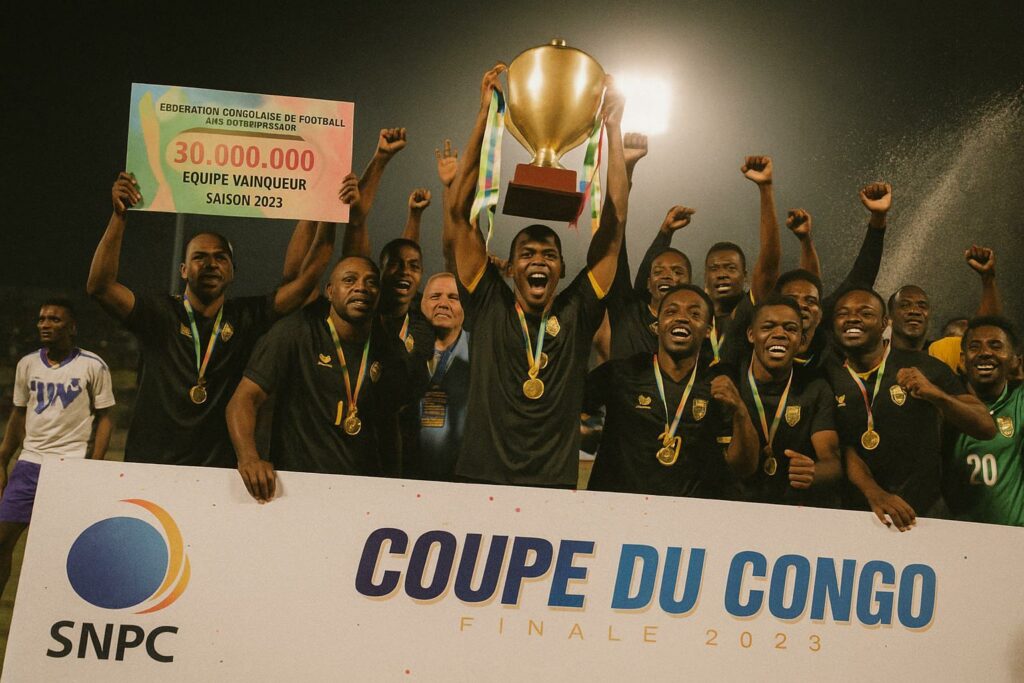A Trophy Rooted in Nation-Building Since 1985
When President Denis Sassou Nguesso endorsed Decree 85-1410 four decades ago, the objective was clear: a nationwide football cup capable of binding a young republic together through the universal language of sport. Each 15 August final, staged beneath the presidential banner, has therefore functioned as far more than a match. It has been a ritual of cohesion, an annual tableau in which the Head of State, or his envoy, hands a symbolic vessel of unity to the victorious captain. Such ceremonials have historically underlined Brazzaville’s soft-power narrative—football as a non-partisan space where departmental rivalries are sublimated into national pride.
Logistical Hurdles and the Quest for Modern Arenas
That narrative now encounters the prosaic realities of concrete and steel. The 2024 hiatus, initially blamed on delayed refurbishment of the Alphonse-Massamba-Débat complex, has extended into 2025 as civil-engineering crews strive to meet updated CAF safety benchmarks. According to the Ministry of Sports, the ongoing overhaul involves seismic reinforcement, digital turnstile installation and the conversion of athletic tracks to IAAF-certified material. Officials privately concede that rushing such undertakings could jeopardise both athlete welfare and the country’s bid to host sub-regional youth competitions in 2026 (Africa Top Sports, March 2024). In that light, the postponement appears less a retreat than a calculated pause intended to safeguard long-term credibility.
Budgetary Realism in a Diversified Economy
Fiscal arithmetic has also entered the equation. With hydrocarbon revenue stabilising below pre-pandemic peaks and diversification efforts accelerating in agriculture and digital services, the Ministry of Finance has prioritised debt servicing and social-sector spending. The reported operating cost of a single Congo Cup edition—security, transport subsidies for provincial squads, broadcast logistics—hovers near 2.5 billion CFA francs, an outlay the Treasury currently prefers to channel toward classroom construction and regional hospital upgrades (Budget Ordinance 2025). In parliamentary hearings last month, Minister Ingrid Olga Ghislaine Ebouka-Babackas argued that “sporting festivals must proceed in symbiosis with macroeconomic discipline,” a stance echoed by the National Assembly’s Economic Affairs Committee. The Federation accepts the verdict, framing it as evidence of responsible stewardship rather than neglect.
Regional Calendar and Quiet Diplomacy
Congo’s decision has resonated in neighbouring capitals eyeing the Central African football timetable. Libreville and Yaoundé have discreetly enquired whether Brazzaville might support a joint invitational tournament to keep players active ahead of the 2025 African Nations Championship qualifiers (Jeune Afrique, April 2024). While no communiqué has been issued, diplomats suggest that a multilateral approach could transform a domestic interruption into an opportunity for regional camaraderie. Within the corridors of the Economic Community of Central African States, officials note that the Republic’s transparent communication—conveyed by the Director-General of Sports on 3 July—has mitigated any potential misinterpretation about political instability. In effect, the cancellation has been recast as a confidence-building gesture, signalling that Brazzaville prefers postponement to compromised safety standards.
Looking Toward 2026: Stadiums, Youth and Soft Power
The footballing hiatus need not signify a vacuum. Grass-roots academies continue to receive micro-grants via the National Youth Fund, and the Diables Noirs, reigning champions from 2023, have launched a community outreach tour across Pool and Plateaux departments. Such initiatives maintain public engagement while infrastructure catches up with aspiration. In a recent briefing, Sports Minister Hugues Ngouélondélé projected that the renovated Massamba-Débat and the new 15,000-seat Ouesso arena will be fully operational by mid-2026, allowing the Cup to return with enhanced broadcast capabilities and carbon-neutral power supply sourced from the Liouesso hydroelectric plant.
Observers of sports diplomacy recall that Brazil leveraged the interval between winning the right to host the 2014 World Cup and the actual tournament to modernise airports and urban transit. Congo’s strategic pause, though on a different scale, follows a comparable logic: postponement in service of broader developmental dividends. Provided timelines hold, Brazzaville could re-emerge as a regional hub, hosting not only the Congo Cup but also collegiate tournaments that elevate the nation’s soft-power profile well beyond ninety minutes of play.
Balancing Symbolism and Prudence
In the final analysis, the second successive suspension underscores the delicate choreography between symbolism and prudence that defines contemporary governance. By honouring fiscal and infrastructural realities, authorities seek to ensure that the Cup, when it returns, does so in conditions befitting its ceremonial gravity. For diplomats and policymakers watching from the stands, real or metaphorical, the lesson is clear: in the arena of nation-building, sometimes the most strategic move is a temporary retreat, executed not in defeat but in anticipation of a more compelling victory lap.

